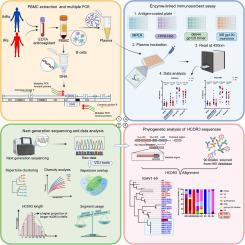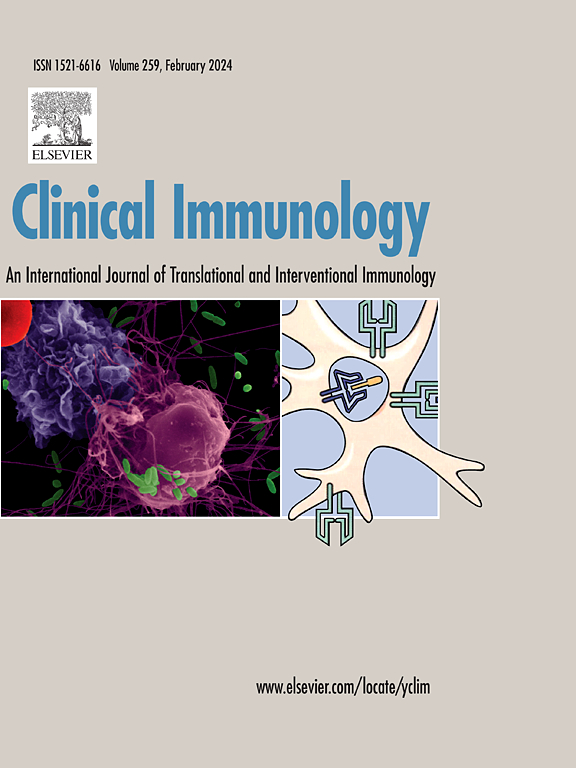新一代测序鉴定的B细胞受体谱显示了与HIV感染者不完全免疫重建相关的特征。
IF 3.8
3区 医学
Q2 IMMUNOLOGY
引用次数: 0
摘要
不完全的免疫重建对艾滋病毒感染者的抗逆转录病毒治疗(ART)提出了重大挑战。B细胞受体(BCRs)在免疫重建中的作用是免疫系统的一个关键方面,但在经历过art治疗的人群中尚未得到很好的阐明。我们利用新一代测序技术分析了免疫无应答者(INRs)和免疫应答者(IRs)的BCR重链库。INRs的BCR库的特点是HCDR3较长比例较高,IGHV1-69、IGHJ2、IGHV1-69/IGHJ4和IGHV5-51/IGHJ4配对频率较低。INRs而不是IRs携带HCDR3基因,这些基因与靶向包膜gp41中六螺旋束(6HB)的抗hiv广泛中和抗体高度同源。INRs的血浆也表现出对fpr - n36 (6HB内的肽)的反应性增加。这些发现提示了BCR、部分gp41抗体和不完全免疫重建之间的潜在关联,并为理解BCR库和免疫重建提供了新的视角。本文章由计算机程序翻译,如有差异,请以英文原文为准。

B cell receptor repertoires identified by next-generation sequencing showed signatures associated with incomplete immune reconstitution in people living with HIV
Incomplete immune reconstitution poses a significant challenge for anti-retroviral therapy (ART) in HIV-infected individuals. The role of B cell receptors (BCRs) in immune reconstitution, a critical aspect of the immune system, has not been well elucidated in ART-experienced people. We analyzed the BCR heavy chain repertoire in immune non-responders (INRs) and immune responders (IRs) by next-generation sequencing. The BCR repertoire of INRs was characterized by a higher proportion of longer HCDR3 and reduced frequencies of IGHV1–69, IGHJ2, and IGHV1–69/IGHJ4 and IGHV5–51/IGHJ4 pairings. INRs, rather than IRs, carried HCDR3 genes which were highly homologous to anti-HIV broadly neutralizing antibodies targeting the six-helix bundle (6HB) in envelope gp41. The plasmas of INRs also exhibited an increased reactivity to FPPR-N36, a peptide within 6HB. These findings indicated a potential association between BCR, antibodies to partial gp41, and incomplete immune reconstitution and provided new perspectives for understanding the BCR repertoire and immune reconstitution.
求助全文
通过发布文献求助,成功后即可免费获取论文全文。
去求助
来源期刊

Clinical immunology
医学-免疫学
CiteScore
12.30
自引率
1.20%
发文量
212
审稿时长
34 days
期刊介绍:
Clinical Immunology publishes original research delving into the molecular and cellular foundations of immunological diseases. Additionally, the journal includes reviews covering timely subjects in basic immunology, along with case reports and letters to the editor.
 求助内容:
求助内容: 应助结果提醒方式:
应助结果提醒方式:


